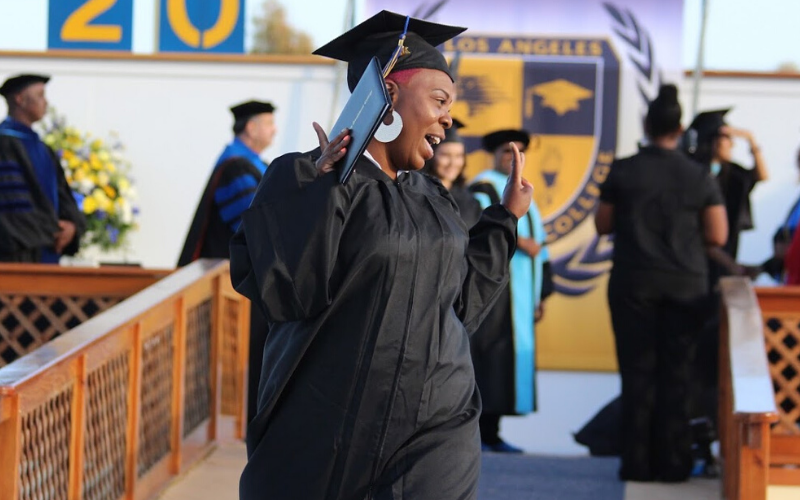History (AAT)
Careers in History
The strong analytical, research and critical-thinking skills developed through studying history are a crucial benefit for any employer needing an independent, dedicated employee.
Those with backgrounds in history have a wide range of careers they can go into, such as government, business, teaching, entertainment, public relations, law, writing, and nonprofit work.
Here are some careers and their salaries you could have with an Associate Degree for Transfer in History:
Career information below taken from bls.gov November 2019. Go to bls.gov for most current career information.
Develop written content for various types of media.
Data for Los Angeles/Long each/Anaheim
| Typical Education Level: | Salary: | Hourly Median Wage: |
|---|---|---|
| Bachelor’s Degree | $109,690/year | $52.73/hour |
| Work Experience in a Related Occupation: | Job Outlook 2018-2028: | Number of Jobs 2018: |
| None needed | 9% increase (faster than average) | 4,680 |
Plan, direct, and coordinate the administrative functions of an organization.
Data for Los Angeles/Long Beach/Anaheim
| Typical Education Level: | Salary: | Hourly Median Wage: |
|---|---|---|
| Bachelor’s Degree | $136,420/year |
$65.59/hour |
| Work Experience in a Related Occupation: | Job Outlook 2018-2028: | Number of Jobs 2018: |
| 5 years or more | 3% increase (slower than average) | 6,780 |
Restore, maintain, or prepare objects in museum collections for storage, research, or exhibit. May work with specimens such as fossils, skeletal parts, or botanicals; or artifacts, textiles, or art. May identify and record objects or install and arrange them in exhibits. Includes book or document conservators.
Data for Los Angeles/Long Beach/Anaheim
| Typical Education Level: | Salary: | Hourly Median Wage: |
|---|---|---|
| Bachelor’s Degree | $49,880/year | $23.98/hour |
| Work Experience in a Related Occupation: | Job Outlook 2018-2028: | Number of Jobs 2018: |
| None needed | 9% increase (faster than average) | 760 |
Study market conditions to examine potential sales of a product or service.
Data for Los Angeles/Long Beach/Anaheim
| Typical Education Level: | Salary: | Hourly Median Wage: |
|---|---|---|
| Bachelor’s Degree | $71,460/year | $34.36/hour |
| Work Experience in a Related Occupation: | Job Outlook 2018-2028: | Number of Jobs 2018: |
| None needed | 5% increase (as fast as average) | 36,110 |
Instruct students in a wide variety of academic and technical subjects beyond the high school level.
Data for Los Angeles/Long Beach/Anaheim
| Typical Education Level: | Salary: | Hourly Median Wage: |
|---|---|---|
| Master’s Degree | $107,070/year | N/A |
| Work Experience in a Related Occupation: | Job Outlook 2018-2028: | Number of Jobs 2018: |
| None needed | -5% decrease (decline) | 490 |
Research, analyze, interpret, and write about the past by studying historical documents and sources.
Data for state of California
| Typical Education Level: | Salary: | Hourly Median Wage: |
|---|---|---|
| Master’s Degree | $88,770/year | $42.68/hour |
| Work Experience in a Related Occupation: | Job Outlook 2018-2028: | Number of Jobs 2018: |
| None needed | -5% decrease (decline) | 250 |
Study the origin, development, and behavior of humans.
Data for Los Angeles/Long Beach/Anaheim
| Typical Education Level: | Salary: | Hourly Median Wage: |
|---|---|---|
| Master’s Degree | $68,900/year | $38.12/hour |
| Work Experience in a Related Occupation: | Job Outlook 2018-2028: | Number of Jobs 2018: |
| None needed | 1% increase (little or no change) | 200 |
What You’ll Learn at LASC in History
You can get Associate in Arts for Transfer (AAT) and Associate in Arts (AA) degrees through LASC’s History program where you will enhance your rationale and critical-thinking skills in order to gain understanding of the complexities of today’s world:
- Develop a holistic perspective on issues ranging from local politics to national conversations so you can analyze situations with this context to understand the historical and cultural factors around how and why people react to situations the way they do.
- Advance your research, critical-thinking, and analytical skills to write research papers by studying different sources and finding relevant information to build discussions for your point of view in order to form evidence-based conclusions.
- Build communication and language skills through group and research projects, expand your objectivity skills to make measured and rational decisions within your research, and enhance your curiosity and observation skills to find different ways to look at events and societal changes.
- Discover the complexities of culture and understand the role it plays in human behavior so you can solve issues, make comparisons, and gain a better understanding of how culture impacts people.
- LASC provides internships so you can build your career connections and create community ties for after you graduate.
- To transfer with an Associate in Arts for Transfer (AA-T) degree in History, you’ll save money on your first two years of college at LASC learning from thought-provoking, dedicated faculty. Plus, you can graduate with guaranteed admission into a CSU, and some UCs! See your academic counselor for details.
Degrees & Courses You Will Take
Review the LASC Associate in Arts in History for Transfer (AAT) and Associate in Arts in History (AA) degrees below, along with our required and suggested course of study for these programs. Go to LASC’s current Course Catalog for specific course information:
Major Code: 2205.00
Total Units Required: 60
If you are planning to transfer to a CSU or UC, then an Associate in Arts in History is for you! You can complete an Associate in Arts for Transfer Degree (AAT) in History if you planning to transfer to a CSU History bachelor’s program. By successfully completing this degree, you are guaranteed admission to a CSU upon completion of this program!
The program is designed to develop critical thinking and rationale. The purpose of this program is to understand the complex institutional structure of United States of America.
The Associate in Arts in History for Transfer Degree requirements include:
- completion of 60 CSU transferable units, including the minimum 18 units in the major and the completion of either IGETC or CSU GE;
- a minimum GPA of 2.0.
If you are interested in completing an Associate Degree for Transfer, you must:
- Complete 60 semester units of 90-quarter units that are eligible for transfer to the California State University, including both of the following: *
- The Intersegmental General Education Transfer curriculum (IGETC) or the California State University General Education-Breadth Requirements:
- A minimum of 18 semester units or 27 quarter units in a major or area of emphasis, as determined by the community college district.
*As required by Senate Bill 1440 & California Education Code section 66746
ADTs also require that you must earn a C or better in all courses required for the major area of emphasis. A “P” (Pass) grade is not an acceptable grade for courses in the major.
You should meet with a counselor to determine the necessary course work to complete the general education requirements.
| Required Courses | Units |
|---|---|
| HISTORY 11 Political and Social History of the United States I | 3 |
| HISTORY 12 Political and Social History of the United States II | 3 |
| Select Two Courses: | |
| HISTORY 1 Introduction to Western Civilization I | 3 |
| HISTORY 2 Introduction to Western Civilization II | 3 |
| Select One Courses: | |
| HISTORY 5 History of the Americas I | 3 |
| SPANISH 1 Elementary Spanish I | 3 |
| SPANISH 2 Elementary Spanish 2 | 3 |
| Select one course: | |
| HISTORY 52 The Role of Women in the History of the United States | 3 |
| TOTAL UNITS | 18-20 |
Upon completion of this program, you will be able to:
- Compare, contrast and analyze past events to interpolate the impact of these events on the present political, cultural, legal, economic and social precedents.
- Write a comprehensive essay on the importance of the history of a particular facet to the embedded understanding of today’s problems.
| Required Courses | Units |
|---|---|
| HISTORY 1 Introduction to Western Civilization I | 3 |
| HISTORY 2 Introduction to Western Civilization II | 3 |
| HISTORY 5 History of the Americas I | 3 |
| HISTORY 11 Political and Social History of the United States I | 3 |
| OR | |
| HISTORY 41 The African-American in the History of the United States I | 3 |
| OR | |
| HISTORY 43 The Mexican-American in the History of the United States I | 3 |
| HISTORY 12 Political and Social History of the United States II | 3 |
| OR | |
| HISTORY 42 The African-American in the History of the United States II | 3 |
| HISTORY 52 The Role of Women in the History of the United States | 3 |
| TOTAL UNITS | 18 |
Get Ready Before You Start
Interested in a career in history? Before your first class starts at LASC, you can begin preparing for your career:
- Make an appointment with your LASC academic counselor to review LASC’s program, start to develop a Student Education Plan (SEP), and discuss which four-year colleges and universities are the best match for your future career plans. You can do further research at the Transfer Center where you can find detailed information on hundreds of colleges and universities.
- Still in high school? Search for opportunities to volunteer with museums or libraries. Talk with your high school counselor to find out if there are opportunities to intern at institutions like these or shadow someone for the day. Ask about summer opportunities in your local community where you can learn more, and gain more experience.
- Once you’re at LASC, make sure to get involved with on-campus clubs and organizations, become a student ambassador, or run for student body government. These create new relationships and show potential employers your commitment to strengthening your writing, communication, and leadership skills.
Program Learning Outcomes

The program is designed to develop critical thinking and rationale. As a student, upon successfully completing this program, you will be able to understand the complex institutional structure of United States of America.
